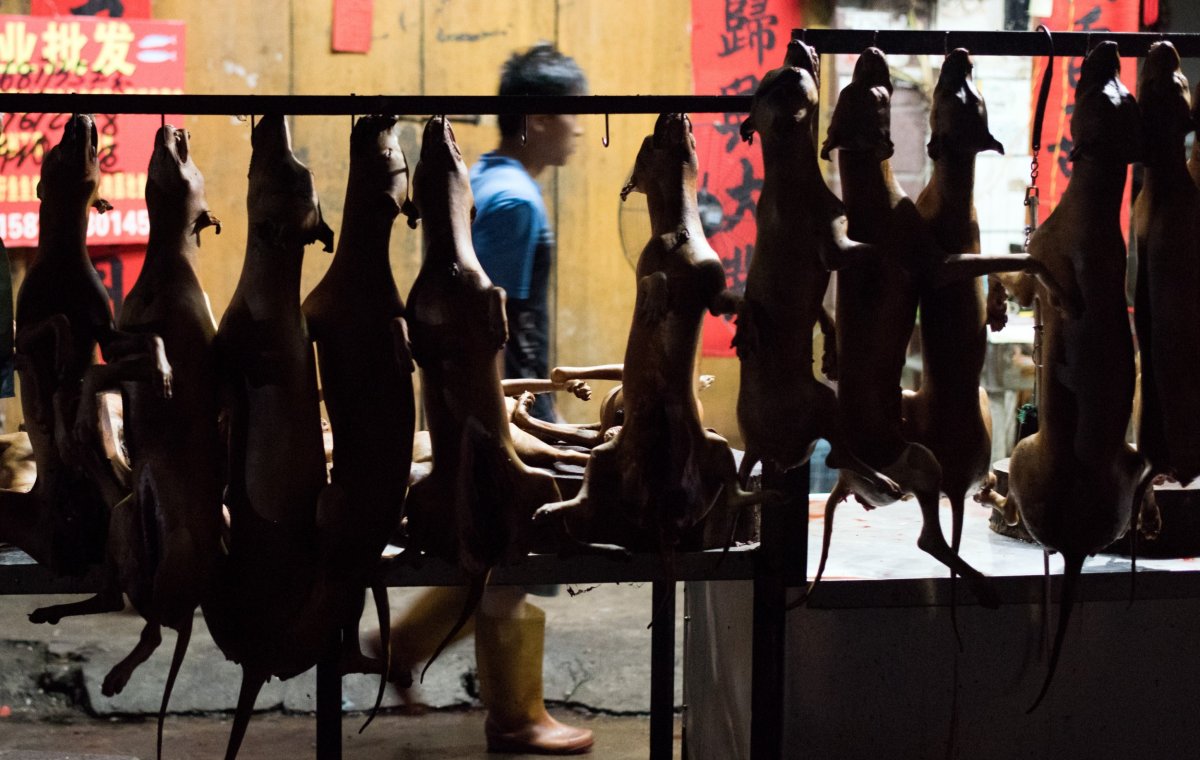Again, this year, some 10,000 dogs and cats will be clubbed and some even skinned alive for the infamous Yulin Dog Meat Festival. And yet, there will be a public outcry in China because animal rights is having something of a golden moment in the country.
Some 30 million dogs suffer in the meat trade across Asia. At one Chinese slaughterhouse, an eyewitness found that dogs were bludgeoned with a metal rod while others looked on, petrified—all so that their skins could be turned into leather.
But people are waking up. They're realizing that might doesn't make right and that it's time for our species to stop acting like a schoolyard bully toward every other living being on the planet.
Here's just one example: After PETA released an exposé of circuses and circus-training facilities in Suzhou showing that bear cubs were chained to a wall and forced to stand upright for hours and that lions, tigers, and other animals were violently beaten, the State Forestry Department raided a circus and confiscated more than 20 bears when trainers failed to show a license for them.
Some 70 million people watched the footage on Chinese social media channels, and even government newspapers took a break from toeing the party line to proclaim, "It made us cry—those poor animals!"

Social media networks, including Weibo and WeChat, have played a key role in the mass awakening to animal rights of millions of Chinese people, especially the youth population—and PETA Asia is now ranked as the fourth most influential charity on Weibo.
After Animals Asia publicized the story of Pizza, "the world's saddest polar bear," who is imprisoned in a concrete cell at the Grandview Aquarium in a Guangzhou shopping mall grassroots groups mobilized to attempt to shut down the aquarium.
And a number of families who had purchased tickets to a circus at Beijing's Workers' Stadium changed their minds and refused to attend after activists from Freedom for Animal Actors stood outside the entrance to the venue wearing animal masks, furry costumes, and chains, urging, "Please don't watch animal performances."
RELATED: Why Is Trump Covering Up Animal Cruelty Cases?
People are realizing that animals aren't windup toys for our amusement—and that they aren't fabrics, either. For much of the past decade, China, which still lacks any meaningful animal-welfare laws, was the world's largest buyer and producer of fur. Millions of animals are still strangled, electrocuted, and bludgeoned every year in the country, but the industry is declining.
In 2016, the number of minks skinned for fur dropped by 41 percent, and the number of foxes and raccoon dogs killed decreased by 13 percent and 9 percent, respectively. Actors such as Sun Li, Yang Mi, and Bo-Lin Chen have spread the word to their millions of followers on social media that not only is draping yourself in fur cruel, it also makes you look like a cave dweller.
RELATED: We Are Seeing Animals in a Different Light
There's also good news for the 300,000 animals used every year in cosmetics tests in which chemicals are dripped into their eyes, smeared onto their shaved skin, or forced down their throats: Last year, China ended the requirement that "non–special use" cosmetics be registered with the Chinese Food and Drug Administration, which means that it's no longer automatically required that they be tested on animals.
And eating cruelty-free in China has never been easier, with nearly 100 vegan and vegetarian restaurants in Shanghai alone.
Who's driving this demand? The more than 50 million residents who have reportedly gone vegetarian or vegan to help animals, improve their health, and protect the environment.
China hasn't historically been viewed as a bastion of animal rights, but progress is being made. People are refusing to stand by silently while animals suffer, and the government is taking notice and taking action. There is still much to be done, but with this momentum, even Yulin's days are numbered.
Jason Baker is vice president of international campaigns for PETA Asia. He was instrumental in the creation of PETA Asia, PETA Australia, and PETA India and has lived in Asia for nearly 20 years.
Uncommon Knowledge
Newsweek is committed to challenging conventional wisdom and finding connections in the search for common ground.
Newsweek is committed to challenging conventional wisdom and finding connections in the search for common ground.
About the writer
To read how Newsweek uses AI as a newsroom tool, Click here.








